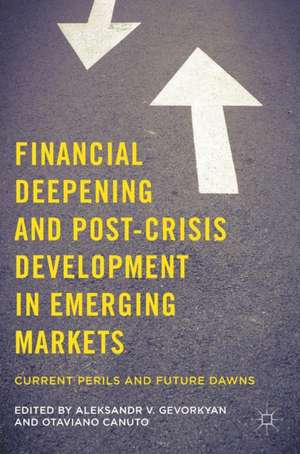Financial Deepening and Post-Crisis Development in Emerging Markets: Current Perils and Future Dawns
Editat de Aleksandr V. Gevorkyan, Otaviano Canutoen Limba Engleză Hardback – 11 iun 2016
Preț: 783.98 lei
Preț vechi: 956.08 lei
-18% Nou
Puncte Express: 1176
Preț estimativ în valută:
150.03€ • 162.91$ • 126.03£
150.03€ • 162.91$ • 126.03£
Carte tipărită la comandă
Livrare economică 23 aprilie-07 mai
Preluare comenzi: 021 569.72.76
Specificații
ISBN-13: 9781137522450
ISBN-10: 1137522453
Pagini: 270
Ilustrații: XIX, 279 p. 68 illus.
Dimensiuni: 148 x 210 x 23 mm
Greutate: 0.5 kg
Ediția:1st ed. 2016
Editura: Palgrave Macmillan US
Colecția Palgrave Macmillan
Locul publicării:New York, United States
ISBN-10: 1137522453
Pagini: 270
Ilustrații: XIX, 279 p. 68 illus.
Dimensiuni: 148 x 210 x 23 mm
Greutate: 0.5 kg
Ediția:1st ed. 2016
Editura: Palgrave Macmillan US
Colecția Palgrave Macmillan
Locul publicării:New York, United States
Cuprins
1 Emerging Markets and the Post-2008 World.- 2 Post-Crisis Lessons for EME Capital Markets.- 3 Interest Rates, Terms of Trade, and Currency Crises: Are We on the Verge of a New Crisis in the Periphery?.- 4 Devaluation and Labor Market Dualism in Emerging Markets.- 5 Post-2008 Financial Flows to Emerging Economies and Policy Alternatives.- 6 Corporate Cash Holdings and Economic Crises in Mexico.- 7 Nonlinearity Testing of Latin American Exchange Rates.- 8 Liquidity Dynamics and Central Bank Policy Intervention in Select Caribbean Foreign Exchange Markets.- 9 Determinants of Non-Performing Loans in Guyana.- 10 Financial Flows and Productivity in Eastern Europe: Implications for Growth and Policy.- 11 The Changing Character of Financial Flows to Sub-Saharan Africa.- 12 Oil Prices and Bank Profitability: Evidence from Major Oil-Exporting Countries in the Middle East and North Africa.
Recenzii
“This book provides interesting perspectives on the future of emerging market growth. … the editors have compiled 12 chapters written by academic and professional economist from international organisations. The book is divided into three parts. … the reader will find interesting perspectives on multiple challenges facing emerging market economies in this volume.” (Ulrich Volz, Journal of Economics and Statistics, 2017)
Notă biografică
Aleksandr V. Gevorkyan is Assistant Professor of Economics in the Department of Economics and Finance in the Peter J. Tobin College of Business at St. John’s University, USA, and a Vincentian Research Fellow at the Vincentian Centre for Church and Society, USA. He also serves as Economics Subject Matter Expert for the Permanent Observer Mission of the Holy See to the United Nations, and he has worked as a Visiting Research Fellow at the Central Bank of Armenia. Gevorkyan’s extensive teaching and research experience covers themes in macroeconomic policy, economic development, international financial economics, labor migration, sovereign debt, commodities markets, and post-socialist transition economics. He is the author of Innovative Fiscal Policy and Economic Development in Transition Economies (2011).
Otaviano Canuto is Executive Director of the Board of the International Monetary Fund for Brazil, Cabo Verde, Dominican Republic, Ecuador, Guyana, Haiti, Nicaragua, Panama, Suriname, Timor Leste, and Trinidad and Tobago. He previously served as Vice President, Executive Director and Senior Adviser on BRICS economies at the World Bank, as well as Vice President at the Inter-American Development Bank. Canuto has also served the Government of Brazil, where he was State Secretary for International Affairs at the Ministry of Finance. He has an extensive academic background, having served as Professor of Economics at the University of São Paulo and University of Campinas, both in Brazil.
Textul de pe ultima copertă
This collection empirically and conceptually advances our understanding of the intricacies of emerging markets’ financial and macroeconomic development in the post-2008 crisis context. Covering a vast geography and a broad range of economic viewpoints, this study serves as an informed guide in the unchartered waters of fundamental uncertainty as it has been redefined in the post-crisis period. Contributors to the collection go beyond risks-opportunities analyses, looking deeper into the nuanced interpretations of data and economic categories as interplay of developing world characteristics in the context of redefined fundamental uncertainty. Those concerns relate to the issues of small country finance, the industrialization of the developing world, the role of commodity cycles in the global economy, sovereign debt, speculative financial flows and currency pressures, and connections between financial markets and real markets. Compact and comprehensive, this collection offers unique perspectives into contemporary issues of financial deepening and real macroeconomic development in small developing economies that rarely surface in the larger policy and development debates.
